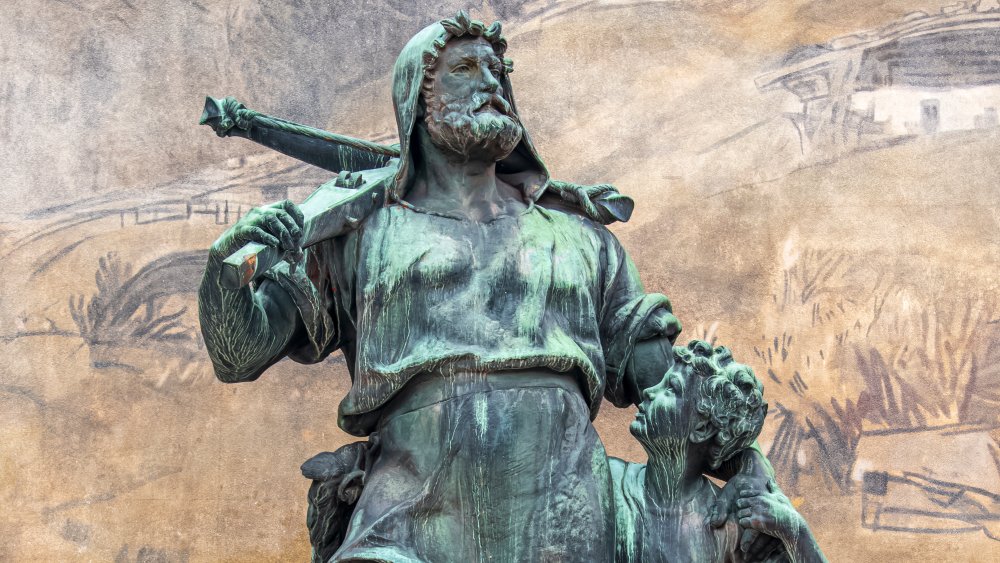William Tell May Never Have Existed. Here's Why.
You most likely know William Tell as that guy who, for whatever reason, shot an apple off his son's head (and from that overture that makes you think of old Westerns), but in Switzerland he's a national hero. Schoolchildren learn in history class that Tell, a poor farmer and hunter from the small market town of Altdorf, was the man who sparked the revolution that birthed the thriving modern-day country of Switzerland. Or rather, they used to. His entry in Britannica now classifies him as the "legendary hero who symbolized [Switzerland's] struggle for political and individual freedom," the historical existence of whom is now in dispute.
As the legend has it, in 1307, an Austrian nobleman put a hat on a pole in the town square and forced the townsfolk to uncover their heads in homage anytime they walked by — a practical thing for a person who has nothing else to do but wait around all day for peasants to doff their hats to a pole. When Tell kept his own hood on his head as he passed by one day, the duke's bailiff got angry and set up an equally sensible punishment for the intolerable slight. He was to shoot an apple off of his son's noggin at 120 paces, or else it was off with both their heads. Luckily, his arrow pierced the apple and saved both his son's life and his own.
Why William Tell is considered the father of modern Switzerland
According to Smithsonian Magazine, the bailiff was satisfied with Tell's marksmanship (as was Tell's son, surely), but was curious as to why the hunter had put a second arrow inside his jacket before accomplishing the feat. "If my first arrow had killed my son," said Tell, "I would have shot the second at you, and I would not have missed." Leaving a head covered was one thing, but this kind of blatant sass could not go unpunished. The bailiff had Tell arrested and taken down to the lakeshore, where he was put in a boat to be taken to a dark, dingy dungeon somewhere. The bailiff was said to have threatened that Tell would "never more see the sun or moon."
While on the water, the boat carrying Tell and his captors was hounded by the winds of a violent storm. Tell somehow escaped his bonds and was for some reason the only man strong enough to bring the boat to shore. After he disembarked he promptly kicked it back into the choppy waters and escaped into the forest. Back on land, he waited in ambush for the bailiff and finally got his chance to use that second arrow — fatally. Tell went on to rouse the people to rebellion that led to the formation of Switzerland. It's a fun story, but it's highly probable that not a bit of it is true.
Historians can't find any evidence that William Tell existed
Textual evidence suggests that the Swiss most likely got their history all wrong. First, there's no documentation of Tell's existence until around 1570, over 250 years after he was said to have shot that fateful apple. Furthermore, a once-forgotten copy of the Oath of Rütli, the founding document of the confederacy of states that became Switzerland, make no mention of anyone named Tell. You'd think the man responsible for the whole thing would be given at least a passing shout-out. Last of all, an 18th-century Danish historian named Gottlieb de Haller dug up an old Viking tale that almost reads verbatim like the Tell story.
Having lionized Tell for centuries, the Swiss had a hard time swallowing the bitter pill of their misguided history. According to Curious Historian, de Haller's book William Tell: A Danish Fable "caused such an outcry that people publicly burned the book." De Haller himself was only saved from execution after he made an earnest public apology. The skepticism his book seeded in the minds of future historians, however, was enough for everyone to accept that Tell's tale was a myth.
Well, almost everyone. According to Alchetron, a man named Arnold Schärer said in 1986 that he'd found evidence of Tell realness, but historians never bought it. But, experts be damned. The president of the nationalistic right Swiss Democrats party at the time referenced the debunked theory in a speech in 2004.


